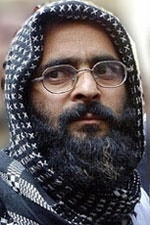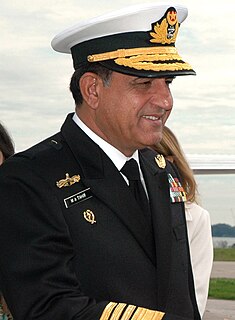Muhammad Afzal may refer to:

The Islamia University of Bahawalpur (IUB), formerly known as Jamia Abbasia, is a public university located in Bahawalpur, Punjab, Pakistan. It is the only government university of the division, which gives standard education in practical as well as in theoretical sense.
Afzal Khan may refer to:

Mohammad Afzal Guru was a Kashmiri separatist, who was convicted for his role in the 2001 Indian Parliament attack. He received a death sentence for his involvement, which was upheld by the Indian Supreme Court. Following the rejection of a mercy petition by the President of India, he was executed on 9 February 2013. His body was buried within the precincts of Delhi's Tihar Jail. Amnesty International has questioned his sentence stating that he did not receive adequate legal representation and that his execution was carried out in secrecy.

Chitral was a princely state in alliance with British India until 1885, then a princely state of Pakistan until 14 August 1947. The area of the state now forms the Chitral District of the Malakand Division, Khyber-Pakhtunkhwa, Pakistan.

Mohammad Afzal Khan was the governor of Afghan Turkestan from 1849 to 1863 and Emir of Afghanistan from May 1866 to October 1867. The oldest son of Dost Mohammad Khan, Afzal Khan was born in Kabul in 1815. His father died on 9 June 1863 and a civil war broke out between Dost Mohammad Khan's sons. In May 1866 he seized power from his brother Sher Ali Khan and captured Kabul. Eventually contracted cholera and died on 7 October 1867. Following Afzal Khan's death, Mohammad Azam Khan was proclaimed Amir of Afghanistan. He was an ethnic Pashtun and belong to the Barakzai tribe.
Cheema is a Punjabi Jat clan of India and Pakistan. They have a high concentration in the villages of Gujranwala and adjoining parts of Sialkot. Most people with the surname are Sikhs in East Punjab and Muslims in West Punjab.
Tarar is a Pakistani and Indian Hindu, Sikh and Muslim Jat surname, mainly found in the Punjab region.

Admiral Muhammad Afzal Tahir, ; NI(M), HI(M), SI(M), LOM, is a retired four-star rank admiral, writer, and the military historian currently serving in the faculty at the Naval War College of Pakistan Navy.
Lakhiwal or Lakhiwal Sharif is a village and union council 139 of Sahiwal Tehsil, Sargodha District, Pakistan. It lies on the Jhelum River.
Afzal may refer to:

Pind Sawika and Bair Faqiran are towns in Jhelum District of Punjab, Pakistan. It is part of Jhelum Tehsil. It is located at the right bank of the Bunhar River and at starting of Tilla Jogian mountain range, where the Tilla Satellite Launch Center is located. As Geography these are two separate towns but economics situation is so different Bair Faqiran and Pind Swika. The Pind sawika is avail some facilities but Bair Faqiran town is without all basic facilities.
Mohammad Afzal is the name of:
Muhammad Afzal Sindhu is a Pakistani politician and lawmaker who is a member of the National Assembly of Pakistan. His constituency is NA-191 in Bahawalnagar, Punjab. He was born in Firozpur, Punjab and hails from the town of Haroonabad in Bahawalnagar district. He holds a Bachelor of Laws degree.
NA-88 (Sargodha-I) is a constituency for the National Assembly of Pakistan.
NA-108 (Faisalabad-VIII) is a constituency for the National Assembly of Pakistan.

NA-169 (Bahawalnagar-IV) is a constituency for the National Assembly of Pakistan.
Sahi may refer to:

Afzal Tauseef, also spelled Afzal Tausif, was a Pakistani Punjabi language writer, columnist and journalist.
The Third Afghan Civil War was fought from 9 June 1863 to January 1869. It began as a result of Dost Mohammad Khan's death on 9 June 1863 and the subsequent power struggles among his sons. Dost Mohammad consolidated his power in the second half of his reign within his inner family. His sons were appointed governors of provinces and effectively acted autonomous from the central government. This would inevitably lead to his sons fighting for control after his death.